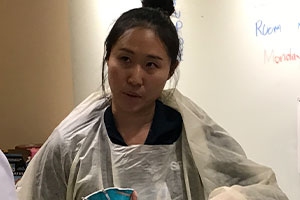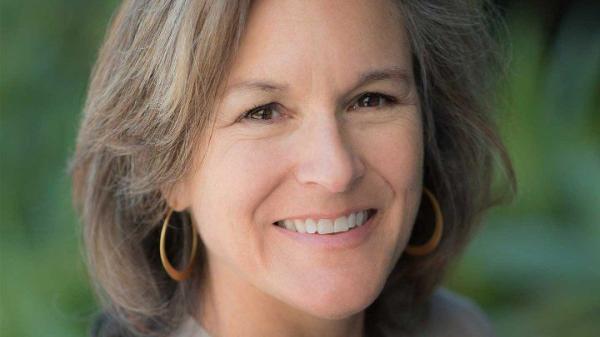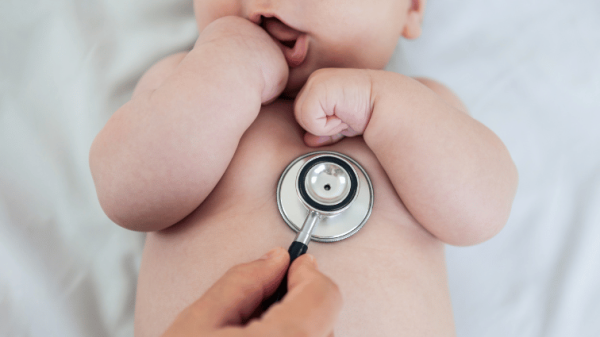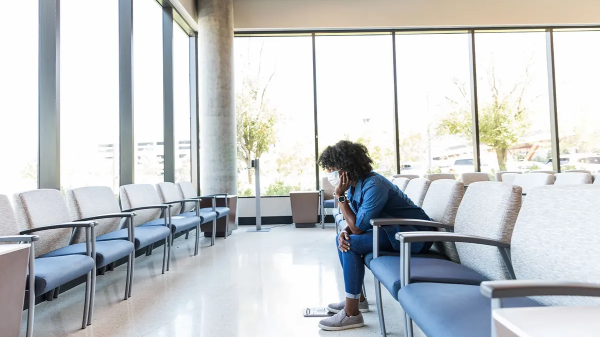Milenko Martinovich
hannah_soc.jpg

The routine has become second nature to Hannah Jang: Clean hands, don the gown, put on the mask, then the goggles — remember to clean your hands again — tie the gown, and lastly, put on the gloves.
Jang performs this routine repeatedly as she carefully trains health care professionals at multiple UCSF sites on how to protect themselves and patients. She doesn’t mind the repetition or the questions, not when those health care professionals treat patients stricken with a deadly virus.
Jang is among the alumni from the UCSF School of Nursing who are playing critical roles amid the outbreak of the novel coronavirus, which causes the disease COVID-19.
Trusting in Information
Jang (PhD ’16) has a wide scope of duties as associate chief nurse researcher and clinical evidence manager at the Institute for Nursing Excellence (INEx). These duties include leading evidence-based practice, research, and quality improvement for UCSF’s 4,000-plus nurses.
But the COVID-19 outbreak has quickly shifted her focus. UCSF Health first began treating patients with the coronavirus in early February.
“When something urgent like this happens, there’s a halt in all the work we do,” Jang said. “Evidence-based practice projects can wait – so can a lot of operational tasks – because we need to address patient and staff safety for the coronavirus.”
UCSF Health has protocols for events like the coronavirus pandemic, but even veteran nurses may need a refresher course. Jang estimates INEx, in partnership with UCSF Health’s Hospital Epidemiology and Infection Prevention and its Safety Office, has held 50 to 100 training sessions for UCSF Health staff, including nurses, on managing coronavirus patients and with her team has trained more than 900 staff. Training includes when to wear masks and which types, reviewing respiratory, contact, and airborne precautions when treating diseases, hand washing, properly donning and doffing gowns and gloves, and screening patients to identify coronavirus. Her colleagues created educational materials for nurses as well and Jang’s team manages the database for all nursing policies, procedures and protocols.
Jang and her team, in coordination with UCSF’s Infection Prevention team, meticulously researched the materials they provided, offering the most accurate, evidence-based data to inform nurses.
For Jang, whose PhD research focused on HIV, UCSF’s tradition of caring for patients affected by epidemics and infectious disease is what inspires her, especially amid the current COVID-19 pandemic.
“Our hospital decided to address [HIV] in the 1980s by caring compassionately for these patients,” Jang said. “For my coworkers and my team, we are very much wanting to provide that same compassionate, evidence-based care during this current crisis.”
A “Disease Detective” at Work in NYC
Dena Bushman (MS ’12) joined the Centers for Disease Control and Prevention in July 2019 as an Epidemic Intelligence Service (EIS) Officer, a role that aligns with her passion to make a positive impact on population health and her professional goal of working at the intersection of public health and clinical medicine, translating data into evidence-based public health solutions.
That opportunity has come against the backdrop of COVID-19.
Bushman is on the front lines, attempting to mitigate the rapidly spreading virus. As a “disease detective” assigned to the New York City Department of Health and Mental Hygiene, she investigates infectious disease outbreaks, national disasters and other threats to public health.
In response to the COVID-19 outbreak, Bushman and her team trained and wrote protocols for health department clinicians who field calls from NYC universities, hospitals, other health care facilities, congregate settings and health care workers. Those protocols include guidance on testing, infection control, and isolation and quarantining procedures.
Bushman and her team also collected specimens from patients who visited city emergency departments who tested negative for influenza and other common respiratory pathogens. Those specimens will be tested for the virus that causes COVID-19.
Bushman said the work has been grueling, but she is grateful for the opportunity and collaboration.
“I feel extremely fortunate to be working in public health and training alongside some of the most intelligent and experienced public health experts,” Bushman said. “There have been many long days and all-nighters, which have been exhausting, but I am energized knowing how privileged I am to be part of a dynamic team protecting the public’s health.”
Bushman credits her education and training at the UCSF School of Nursing, along with her schooling at Johns Hopkins University’s Bloomberg School of Public Health, for preparing her for this role.
“I would not have been able to serve in my current role in COVID-19 preparedness and response without having had my clinical training and experiences,” Bushman said. “Having experienced nurses and nurse practitioners like myself working as epidemiologists in public health, leading efforts in times of outbreaks, is critical to ensuring an effective response.”
Navigating a Global Public Health Emergency
A sudden surge in patients needing critical medical care has the potential to overwhelm health care systems. To help mitigate this, health care experts are working to manage the influx of potential patients at an early stage.
UCSF’s Office of Population Health and Accountable Care, led by its vice president Gina Intinarelli (MS ’05, PhD ’13) and its team of health care navigators, are operating UCSF’s Occupational Health’s Coronavirus Hotline.
At the onset of the outbreak, the navigators would take about 250 calls per week. They took 466 calls on March 17 alone.
The most common questions the navigators receive are where they can go to get tested and should they wear masks. Other calls require navigators to assess patient symptoms over the phone and classify them as negative or positive for coronavirus. The patients with negative assessments are instructed how to manage their symptoms, which may include over-the-counter medications or other remedies.
Patients with positive assessments are directed to nurses Sue Spence (MS ’04) and Nikki Page, who determine the most appropriate course of action for the patient. Navigators have escalated up to 100 cases on a single day.
The navigators’ work is vital. By steering individuals whose symptoms and previous travel don’t fit a coronavirus diagnosis, they ease the burden on area emergency departments.
The navigators, which numbered six when the hotline was established, will increase as advanced practice nursing students from the UCSF School of Nursing join the effort. There are also plans to add more nurses to assist Spence and Page with escalations.
“While there is this heightened sense of uncertainty and urgency, I feel very fortunate to be able to help our patients in their time of need,” Page said.




